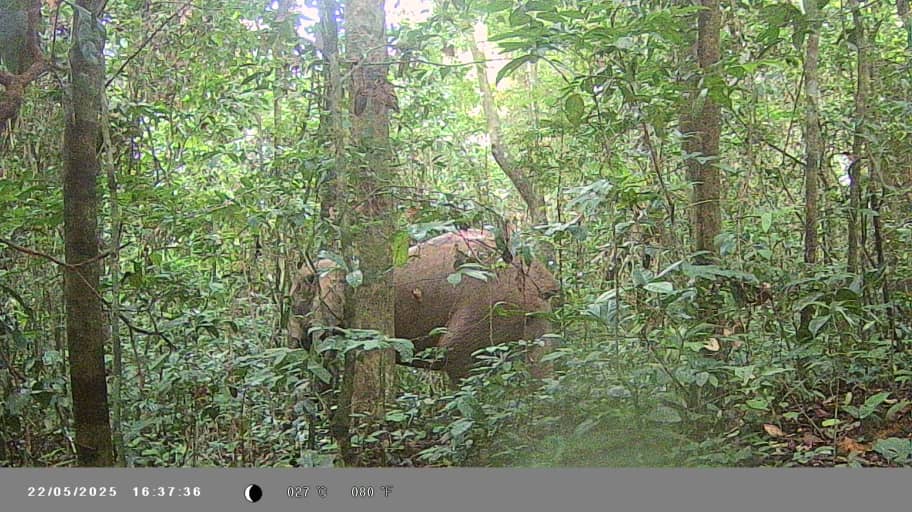
Elephants Return to Iko Esai: A Decade-Long Wait Ends in Cross River’s Community Forests
On the 22nd of May 2025, a camera trap placed deep within the community forest of Iko Esai, Cross River State, captured a remarkable image. At about 4:37 p.m., an African forest elephant walked quietly across the frame. For the community, it was the first confirmed sighting of an elephant in more than ten years.
“We haven’t seen an elephant in our forest for over a decade. This gives us hope that they still belong here,” a community member shared with pride.
The sighting marks a turning point for both wildlife and people. It is the product of deliberate and sustained efforts led by the Nigerian Conservation Foundation (NCF) and its partner, the Nature and Biodiversity Conservation Union (NABU).

Camera trap showing the forest elephant. Credit: Nigerian Conservation Foundation
A Project Reviving Forests and Communities
In 2023, NCF and NABU launched a three-year Community Forest Management and Livelihood Improvement Project across eight buffer communities (Iko Esai, Iko Ekperem, New Ekuri, Old Ekuri, Ifumkpa, Owai, Agoi Ibami, and Agoi Ekpo.) surrounding the Cross River-National Park. The project works on multiple fronts: restoring degraded forests, strengthening indigenous forest governance, and improving livelihoods for forest-dependent families.
In Iko Esai, eco-guards recruited from the local community patrol the forests regularly. They dismantle wire snares, monitor illegal logging, and ensure community compliance with environmental regulations. Capacity-building sessions and livelihood support have reduced the community’s reliance on destructive forest practices. These interventions, combined with policy wins such as the reintroduction of a logging ban, have allowed wildlife to slowly reclaim their space.
“Before the project, elephants had not been seen or heard of in this forest for years,” explained Joshua Dazi, project officer.
“Reduced disturbance has made their return possible. Monitoring continues, and we are preparing to manage potential conflicts between elephants and people through continuous sensitization and capacity building.”
Why This Sighting Matters
The return of elephants to Iko Esai is more than a local victory. It resonates across Nigeria and the wider Central African region. Forest elephants (Loxodonta cyclotis) are listed as Critically Endangered by the IUCN. Over the last three decades, their numbers have collapsed by more than 86 percent due to habitat loss and ivory poaching.
Nigeria once hosted between 1,200 and 1,500 elephants. Today, fewer than 400 remain nationwide, with only an estimated 200–300 forest elephants surviving. Cross River is among their last refuges in the country. The forests here, stretching into Cameroon’s Takamanda and Korup reserves, form a vital transboundary corridor.
Against this backdrop of steep decline, even a single photograph of a forest elephant in Iko Esai is momentous. It proves that conservation at the grassroots level when rooted in community stewardship and effective governance can create the space needed for these giants to endure.

Second footage of the forest elephant from the camera trap. Credit: Nigerian Conservation Foundation.
Solving Human-Animal Conflict
The return of elephants also brings challenges. In forest-edge communities, elephants can destroy crops and spark tensions. In Iko Esai, preparations are underway to prevent conflict before it escalates. This includes more sensitization, expanded monitoring, and exploring technological tools that can detect elephant movements before they approach human settlements.
NCF and NABU will continue to support eco-guards in their daily work and to deepen community involvement in conservation decisions. The next phase includes surveys to estimate how many elephants remain and where they move within the landscape.
A Walking Emblem of Hope
For Iko Esai, the elephant’s return is more than a biological event. It is a symbol of resilience for the forest, for a community learning to live with nature, and for a species whose future hangs by a thread.
Cross River’s forests have always been at the heart of Nigeria’s biodiversity. With patient conservation and the determination of its people, they may yet remain a place where forest elephants roam.



